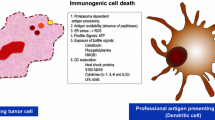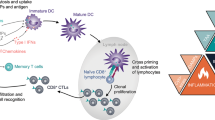Abstract.
Here we discuss how the mechanisms by which tumor cells are killed in vivo by gene transfer affects their immunogenicity. Our own work has shown that necrotic cell death induces immunological activation signals which recruit, load, activate and mature appropriate subsets of antigen-presenting cells. In contrast, for apoptotic cell death to be immunogenic, signals additional to cell death alone must be provided within the milieu of the dying tumor. Our conclusion is that the immunogenicity of tumor killing is determined by a combination of factors, including the mechanism of killing, the levels of cell death, the local environment that exists within the dying tumor and, as a result, the nature of the immune/scavenger cells which are present at the time of antigen release. Knowledge of how these factors can influence the immune system and lead to the breaking of tolerance to tumor-associated antigens, can potentially be exploited in the design of effective immunotherapies for cancer using gene transfer.
Similar content being viewed by others
Author information
Authors and Affiliations
Additional information
Electronic Publication
Rights and permissions
About this article
Cite this article
Melcher, A., Gough, M., Todryk, S. et al. Apoptosis or necrosis for tumor immunotherapy: what's in a name?. J Mol Med 77, 824–833 (1999). https://doi.org/10.1007/s001099900066
Received:
Accepted:
Published:
Issue Date:
DOI: https://doi.org/10.1007/s001099900066




